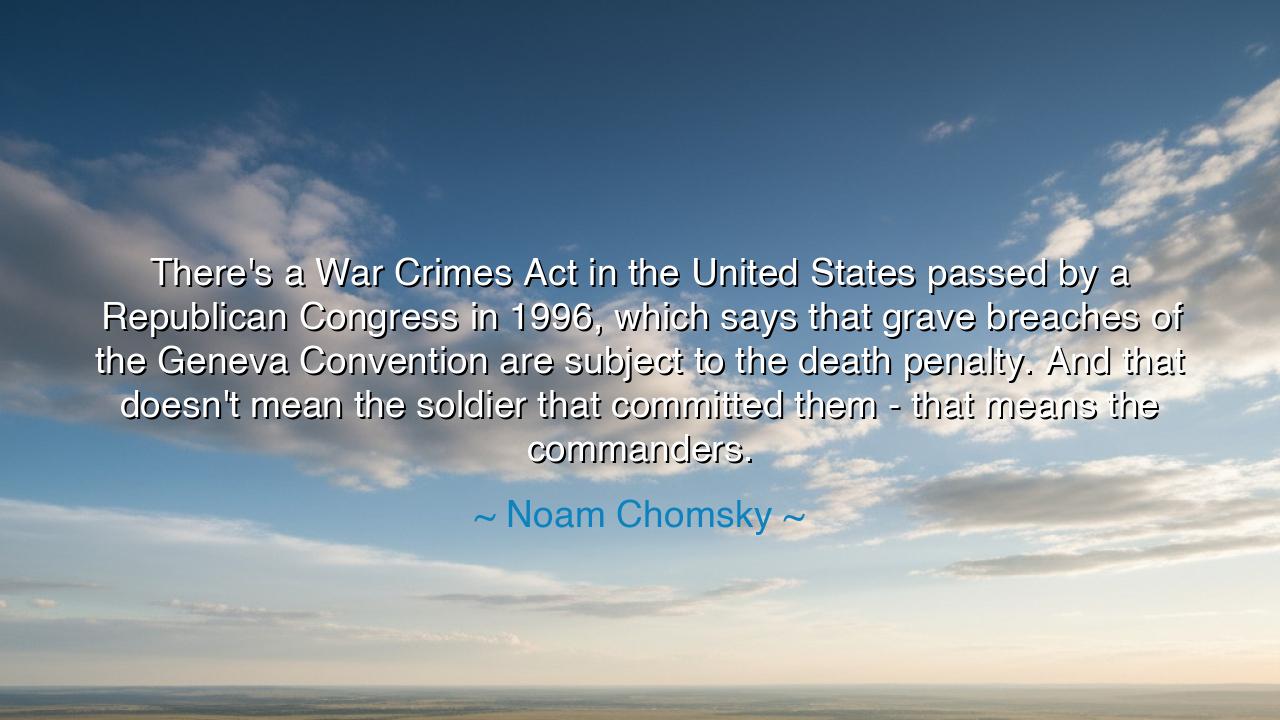
There's a War Crimes Act in the United States passed by a
There's a War Crimes Act in the United States passed by a Republican Congress in 1996, which says that grave breaches of the Geneva Convention are subject to the death penalty. And that doesn't mean the soldier that committed them - that means the commanders.






“There’s a War Crimes Act in the United States passed by a Republican Congress in 1996, which says that grave breaches of the Geneva Convention are subject to the death penalty. And that doesn’t mean the soldier that committed them – that means the commanders.” Thus spoke Noam Chomsky, the scholar and moral witness of our time, whose voice has long stood against the silence of power. In this quote, Chomsky calls forth a truth that is as ancient as justice itself — that responsibility does not end at the lowest ranks of the chain, but rises to the throne of command. The soldier may carry out the order, but it is the commander, the ruler, the architect of policy, who must answer for the blood spilled in his name.
The origin of this quote lies in Chomsky’s critique of political hypocrisy and war-making without accountability. In the 1990s, the War Crimes Act of 1996 was enacted in the United States, a law designed to uphold the Geneva Conventions, the international agreements that protect civilians and prisoners in times of war. It declared that grave violations — torture, murder, deliberate targeting of innocents — were crimes punishable by death under U.S. law. Yet Chomsky, ever the fierce examiner of power, spoke these words to reveal a deeper irony: that while this law existed to condemn others, it could, by its very words, condemn those who wrote it. For the architects of war, the policymakers who order bombings, invasions, and covert crimes, are not immune to the laws they proclaim.
When Chomsky says, “that doesn’t mean the soldier that committed them — that means the commanders,” he pierces through the veil of moral evasion that has haunted empires since time began. Throughout history, it has been the custom of the powerful to shift the burden of guilt onto the powerless. Kings send men to die, and when atrocities arise, it is the foot soldier who bears the blame, while the throne remains untouched. But true justice — divine and human alike — recognizes no such shield. The crime of the soldier is his obedience; the crime of the commander is his design. Chomsky’s words are a call to remember that leadership bears the heaviest responsibility because it holds the greatest power.
History itself bears witness to this truth. After the Second World War, the Nuremberg Trials were held to bring the architects of Nazi terror to justice. The judges declared a principle that echoed through all ages: that “following orders” is no defense against inhumanity. The generals, the ministers, the planners — these were the ones who faced the judgment of the world. From that moment, a sacred idea was born — that law must rise above authority, and that even a ruler is not beyond the reach of conscience. It is this same spirit that animates Chomsky’s warning: the true test of a nation is whether its laws apply to its leaders, or only to its enemies.
Yet in his voice there is also sorrow — for the law that exists on paper means nothing if courage does not exist in practice. The War Crimes Act, though noble in intent, has rarely been invoked against the powerful. The wars waged, the bombings ordered, the secret prisons maintained — these have often been justified under the banner of necessity, while the law lies silent. Chomsky’s words are not only an indictment of the guilty, but a lament for a people who have forgotten to demand accountability from those who rule them. For a nation ceases to be just when its laws are written for others but not lived by itself.
In this sense, Chomsky’s statement is not only political — it is moral. It reminds us that justice is not the act of punishing enemies, but of facing ourselves. It demands that citizens, too, share in the bravery of truth: to question, to resist, to hold their leaders to the same standard they would demand of any tyrant. The courage of a nation is not found in its armies, but in its conscience. A people that dares not confront its own wrongs becomes complicit in them. The law is not a fortress to hide behind; it is a mirror, showing what we are willing to see.
The lesson, then, is as enduring as the ages: that power must be answerable to principle, and that leadership without accountability is the seed of tyranny. If the commanders of war are never questioned, if the architects of destruction walk unjudged, then no law can save the innocent, and no nation can call itself free. The wise must speak, the citizens must awaken, and justice must not bend to might. To honor the spirit of the War Crimes Act is to demand that truth stand above rank, that morality stand above expedience, and that no hand that wields the sword be beyond the reach of the law.
So remember the warning of Noam Chomsky: “Grave breaches of the Geneva Convention... mean the commanders.” Let these words echo as both a warning and a vow — that power without responsibility is the death of justice, and silence in the face of power is the death of freedom. Let each generation rise not to worship leaders, but to hold them to the light. For a just world cannot exist until we learn that the courage to command must be matched by the courage to answer.






AAdministratorAdministrator
Welcome, honored guests. Please leave a comment, we will respond soon